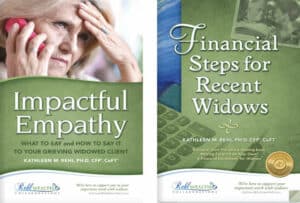
In the blink of an eye, life can change forever. For Lizette Zambrano, this transformation came tragically and unexpectedly. While enjoying a dream vacation at a Mexican beach resort in June, her husband, Jorge, was suddenly killed in a hot tub electrocution accident caused by faulty wiring. The incident not only took Jorge’s life but also left Lizette severely injured, plunging her into a new widow’s world of grief and confusion.
As financial professionals, we prepare clients for the expected — including retirement planning, tax savings, managing investments, and estate planning. But how do we support our clients through the chaos after such a sudden, life-altering event?
Like Lizette, many women are unprepared for the financial and emotional turbulence that widowhood brings. It’s crucial to approach with empathy, patience, and a clear path to help widows navigate this challenging journey.
Money Matters Are Especially Difficult
I’ve experienced widowhood, too. Several years ago, my seemingly otherwise healthy husband was diagnosed with stage 4 cancer. He died two months later, shortly after my 60th birthday. Way too young. Way too fast. We widows learn to lean into a new life and chart a course for changes we didn’t ask for, want, or expect.
Even though I was a financial advisor when my husband died, I wasn’t ready for widowhood. Most women aren’t.
One of the hardest parts for many widows is coping with money issues during their early crushing grief. Neither their hearts nor heads are prepared to make important decisions. This is especially true when death comes unexpectedly.
It’s a commonly accepted statistic that about 70% of widows leave their advisors after their spouse dies. But if a widow believes you understand her and what she needs, she’ll stay. Do this right, and you’ll also attract other widowed clients.
Communicate with Impactful Empathy
The immediate aftermath of a spouse’s death is a period of intense grief and confusion. Advisors must approach their clients with empathy and understanding, avoiding clichés and offering genuine support. Here are some phrases to bypass and alternatives that can be more comforting:
- Don’t say: “You have my deepest sympathy. I know what you’re going through. My dog died last month.”
- Instead, try: “When I heard about Paul’s sudden death, I couldn’t believe it! I didn’t know what to say to ease your pain. How have these past days been?”
- Don’t say: “I listened to a great podcast about overcoming hard times. I’ll send you the link.”
- Instead, try: “Such a terrible accident that took Fred from you and all of us who cared for him. There’s no explanation for his senseless death. I want to be helpful at this sad time.”
- Don’t say: “I’m sorry about all this. We’ll start on the paperwork immediately, and you can sign account changes soon.”
- Instead, try: “I’m here for you. You don’t have to do anything right away with your accounts. Take care of yourself, and let your family and friends step up. They love you. How about I call you [specific date], and we’ll talk more then?”
- Don’t say: “At least you have your children.”
- Instead, try sharing a memory of your client’s husband. We widows don’t want the world to forget our spouses, and these stories help keep his memory alive.
Focus on Financial Triage
In the initial stage of widowhood, clients often feel numb, in a fog, or like they’re going crazy. Some women call this their “Jello-brain” stage. It’s not the time for making major irrevocable decisions but rather for immediate financial triage. Transition specialist Susan Bradley of the Financial Transitionist Institute refers to this as the “decision-free zone.”
- Cash Flow: Ensure your client’s cash flow is stable. Confirm that bills are paid and insurance remains in force.
- Death Benefits: Help your client apply for death benefits, but advise against investing new money instantly. Park life insurance proceeds in a safe and stable account until new goals are set.
- Guard Against Bad Advice: Your widowed client may need assistance in fending off well-intentioned family and friends who offer them inappropriate “hot investment advice.” Also, help her beware of shysters who prey on lonely widows through social media.
Be Her Thinking Partner
Your role as a financial advisor is to be there for the long term, providing support and guidance without dictating decisions. You’ll help a new widow make the right decisions for herself and her family, assisting her in moving forward.
- Early Stages: Focus on financial stability and safety. Avoid major decisions and help her through the initial grief.
- Later Stages: As your client transitions from grief to growth and transformation, assist with general planning, repositioning investment portfolios, career or postretirement decisions, estate plan updates, education planning and housing issues.
- Advanced Planning: When your client is ready, help with advanced estate planning and possibly philanthropic planning, if relevant.
The sudden death of a spouse is one of the most challenging experiences a person can face. As financial advisors, we aim to provide widows with a safe and supportive space, helping them navigate their grief and the following financial complexities. By communicating with empathy, focusing on immediate needs, and being supportive, we can assist widows in rebuilding their lives and finding a path forward.
By being a steady, compassionate presence, you can assist your client in navigating through one of the most challenging times in her life. Your support will strengthen your relationship with her and attract other widows who need and want your expertise.
Blessings in your important work with widows.
 Kathleen M. Rehl, PhD, CFP®, CeFT® Emeritus wrote the award-winning book “Moving Forward on Your Own: A Financial Guidebook for Widows.” She owned Rehl Financial Advisors for 18 years before an encore career empowering widows. Now “reFired,” Rehl writes legacy stories and assists nonprofits. Her work has appeared in the New York Times, Wall Street Journal, Kiplinger’s, CNBC and more. She’s an adjunct at The American College of Financial Services. Her free e-booklets “Impactful Empathy” and “Financial Steps for Recent Widow,” can be found on her website, is https://www.kathleenrehl.com.
Kathleen M. Rehl, PhD, CFP®, CeFT® Emeritus wrote the award-winning book “Moving Forward on Your Own: A Financial Guidebook for Widows.” She owned Rehl Financial Advisors for 18 years before an encore career empowering widows. Now “reFired,” Rehl writes legacy stories and assists nonprofits. Her work has appeared in the New York Times, Wall Street Journal, Kiplinger’s, CNBC and more. She’s an adjunct at The American College of Financial Services. Her free e-booklets “Impactful Empathy” and “Financial Steps for Recent Widow,” can be found on her website, is https://www.kathleenrehl.com.







